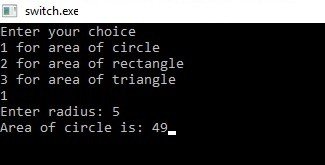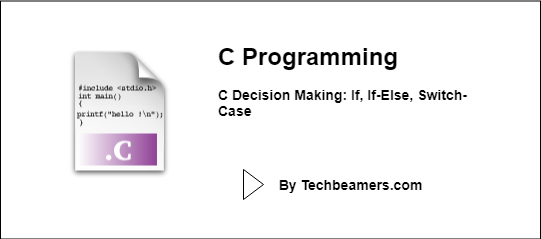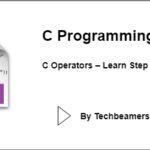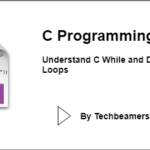In this C programming class, we’ll cover the C decision-making constructs such as C if, if-else, and the switch-case statement. It is also known as conditional programming in C.
In your life, you encounter situations where you have to make a decision be it your favorite food dish or the color of your new car. In C programming also, you may encounter such situations where you need to make a decision.
The conditions in C language will help you. C primarily provides the following three types of conditional or decision-making construct.
Don’t miss out on how to write your first C program in just 2 minutes.
If Statement in C
The if statement helps you check a particular condition. If that condition is true, then a specific block (enclosed under the if) of code gets executed.
This flowchart will help you.
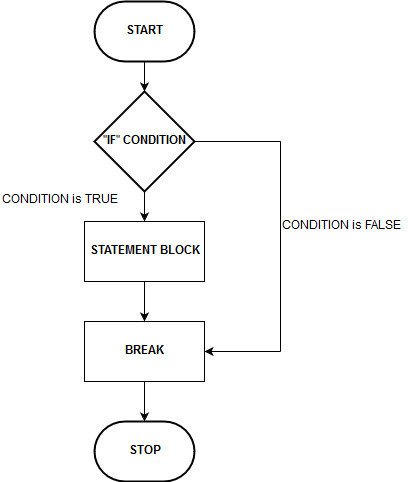
C If Syntax:
if(condition either true or false)
{
//Statement block
}Now we will see a simple program using an if statement.
Program using C If Statement to Find the Greatest of Two Numbers.
Flowchart:
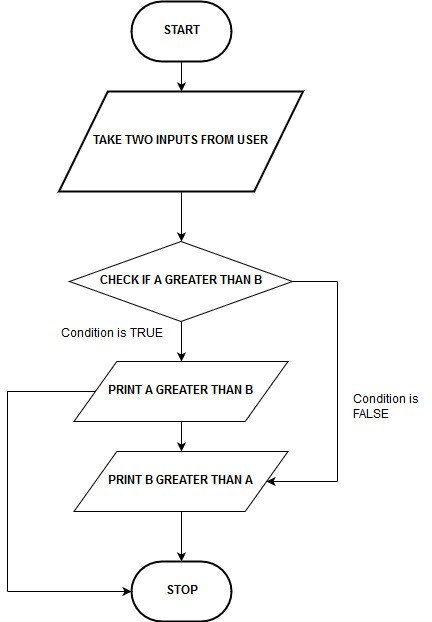
Algorithm:
Step 1: Start. Step 2: Take two inputs (a and b) from the user. Step 3: If a is greater than b then go to step 4 otherwise go to step 5 Step 4: Print a greater than b Step 5: Print b greater than a Step 6: Stop.
Code:
#include<stdio.h>
#include<conio.h>
void main()
{
int a,b;
printf("Enter two numbers :");
scanf("%d %d",&a,&b);
if (a>b)
printf("%d is greater",a);
printf("%d is greater",b);
getch();
}The output is as follows:

If…Else Statement in C
The if statement works pretty well, but if you want to work with more variables and more data, the if-else statement comes into play.
In the if statement, only one block of code executes after the condition is true.
But in the if-else statement, there are two blocks of code – one for handling the success and the other for the failure condition.
This flowchart will help you get it.
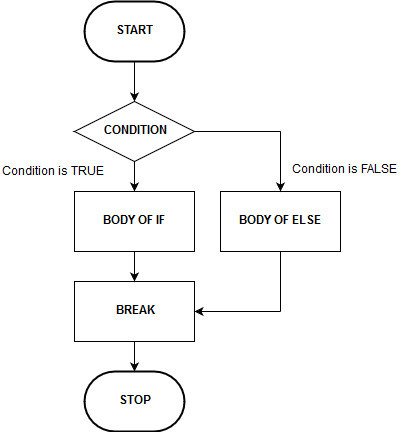
C If…Else Syntax:
if(condition)
{
//Statement block
}
else
{
//Statement block
}Program using C If…Else to Find Whether a Number is Odd or Even.
Flowchart:
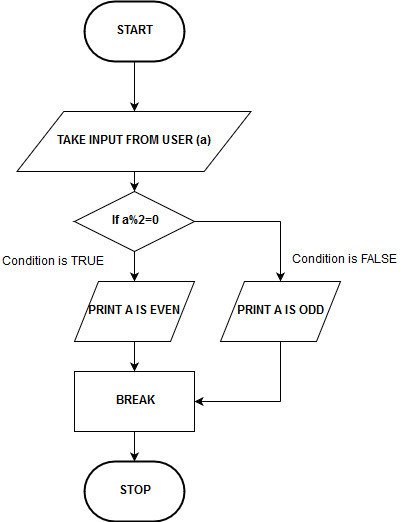
Algorithm:
Step 1: Start. Step 2: Take input from the user. Step 3: Check condition. If remainder is zero go to step 4 else go to step 5 Step 4: Print a is even and go to step 6 Step 5: Print a is odd Step 6: Stop
Code:
#include<stdio.h>
#include<conio.h>
void main()
{
int a;
printf("Enter a number :");
scanf("%d",&a);
if (a%2==0)
{
printf("%d is even",a);
}
else
printf("%d is odd",a);
getch();
}The output should look something like this-
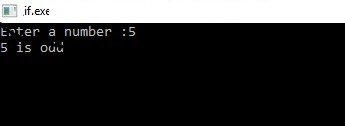
You can use multiple if-else statements which get called “nested if-else” statements. It is no different than the one above you can use various if-else statements in this order. Just keep in mind that the sequence should end with a final else statement, not an if statement.
Switch-Case Statement in C
When you have to execute multiple statements under one operation, Switch-case comes into play.
There are several cases under one switch statement.
C Switch…Case Syntax:
switch(variable)
{
case n1:
//Statement block;
break;
case n2:
//Statement block;
break;
.
.
.
case n:
//Statement block;
break;
}Here the variable is taken from the user as input.
Program using C Switch…Case to Calculate the Area of a Rectangle/Circle/Triangle.
Flowchart:
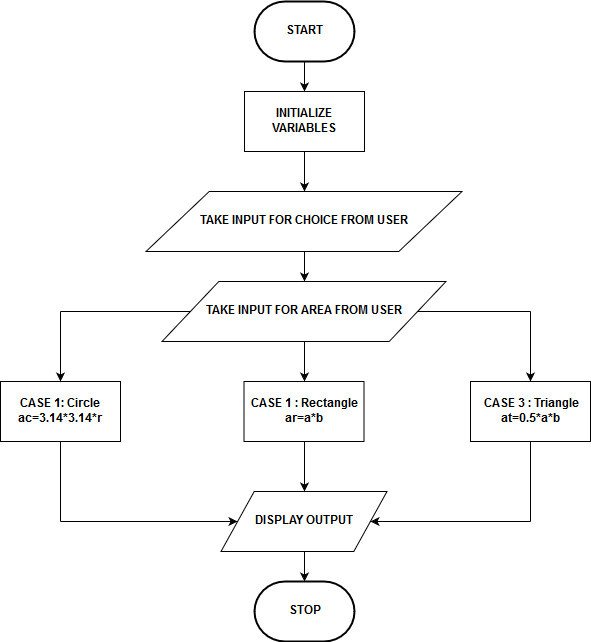
Algorithm:
Step 1: Start Step 2: Initialize variables Step 3: Take input for choice and then for area variables from the user Step 4: Case 1: Circle: 3.14*3.14*r Case 2: Rectangle: ar=a*b Case 3: Triangle: at=0.5*a*b Step 5: Display output according to case Step 6: Stop
Code:
#include<stdio.h>
#include<conio.h>
void main()
{
int ac,ar,at,r,a,b,choice;
printf("Enter your choice\n”);
prinft(“A for area of circle\n”);
printf(“B for area of rectangle\n”);
printf(“C for area of triangle\n");
scanf("%c",&choice);
switch(choice)
{
case A:
printf("Enter radius: ");
scanf("%d",&r);
ac=3.14*3.14*r;
printf("Area of circle is: %d",ac);
break;
case B:
printf("Enter length and breadth:");
scanf("%d %d",&a,&b);
ar=a*b;
printf("Area of rectangle is: %d",ar);
break;
case C:
printf("Enter base and height: ");
scanf("%d %d",&a,&b);
at=0.5*a*b;
printf("Area of triangle is: %d",at);
break;
}
getch();
}Output:
